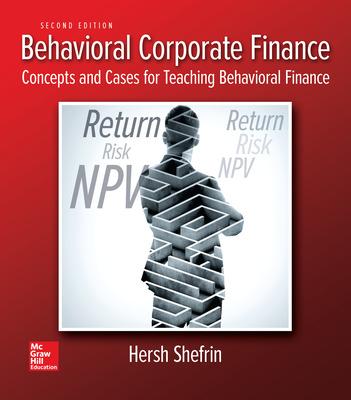How would you assess the review conducted by Hertzs compensation committee in 2013? With reference to the
Question:
- How would you assess the review conducted by Hertz’s compensation committee in 2013?
- With reference to the Hertz minicase, what psycho- logical phenomenon or phenomena were involved in the fraud triangle?
- How would you use the COSO internal control frame- work to assess the internal control environment at Hertz?
- In what ways was the situation at Hertz, as described in the minicase, similar to that of HealthSouth, and in what ways was it different?
In 2013, the car rental company Hertz paid its senior executives a base salary, performance-based bonuses, and performance-based equity. For the CEO, fixed salary was 10.5 percent of total compensation, performance-based cash was 20.4 percent, performance-based equity was 60.5 percent, and the rest fell into a category called “Other.” Compensation for other senior executives featured a bit more fixed salary, 19.8 percent, with corresponding lower percentages for performance-based components. Of the CEO’s total compensation, 81 percent was directly influenced by the firm’s financial and operating performance, while for other senior executives the percentage was 70 percent.
During 2013, Hertz’s compensation committee conducted an annual review of the risk profile of the Corporation’s procedures and Internal Audit Department. The review concluded that:44 for all employees, the Corporation’s enterprise-wide compensation policies and practices, in conjunction with the Corporation’s existing processes and controls, do not incentivize employees to take unnecessary risks, or pose a material risk to the Corporation, particularly in light of the following factors:
- our use of different types of compensation programs, such as equity- and cash-based plans, that provide a balance of long- and short-term incentives;
- our claw-back policies, which allow us in certain circumstances in the event of a financial restatement, to seek the recovery of annual incentive awards, long-term incentive performance- based compensation awarded to many of our employees, including all of our senior executives;
- our use of a variety of financial and strategic performance objectives to help ensure that the Corporation’s overall business strategy is properly promoted.
In its 2013 year-end Form 10-K, Hertz reported that during its fourth quarter it discovered “certain out-of- period errors” which totaled $46.3 million. The company indicated that although the errors were not material in any given period, once aggregated, they would be material to the fourth quarter of 2013, when they were discovered. As a result, the company suggested that it might be restating some past financial results. Separately, at this time, Hertz had a new CFO, Thomas Kennedy, who replaced Elyse Douglas: she had resigned on October 1 in order to avoid having to relocate because the company was moving its main headquarters.
In June 2014, Hertz warned that its current quarterly filing would be late and that its financial statements for 2011 could not be relied upon. Hertz’s board instructed that the financial statements for 2011 be restated, along with the financial statements for 2012 and 2013, as these might reflect the earlier errors.
In June 2014, the company also disclosed that it identified a material weakness in internal control over financial reporting. As a result, the company indicated that it expected to receive an adverse opinion on its internal control over financial reporting from its auditor PricewaterhouseCoopers (PwC). For years, PwC had issued clean audit opinions on Hertz. Notably in inspection ...
Financial statements are the standardized formats to present the financial information related to a business or an organization for its users. Financial statements contain the historical information as well as current period’s financial...
Step by Step Answer:

Behavioral Corporate Finance Concepts And Cases For Teaching Behavioral Finance
ISBN: 9781259277207
2nd Edition
Authors: Hersh Shefrin





